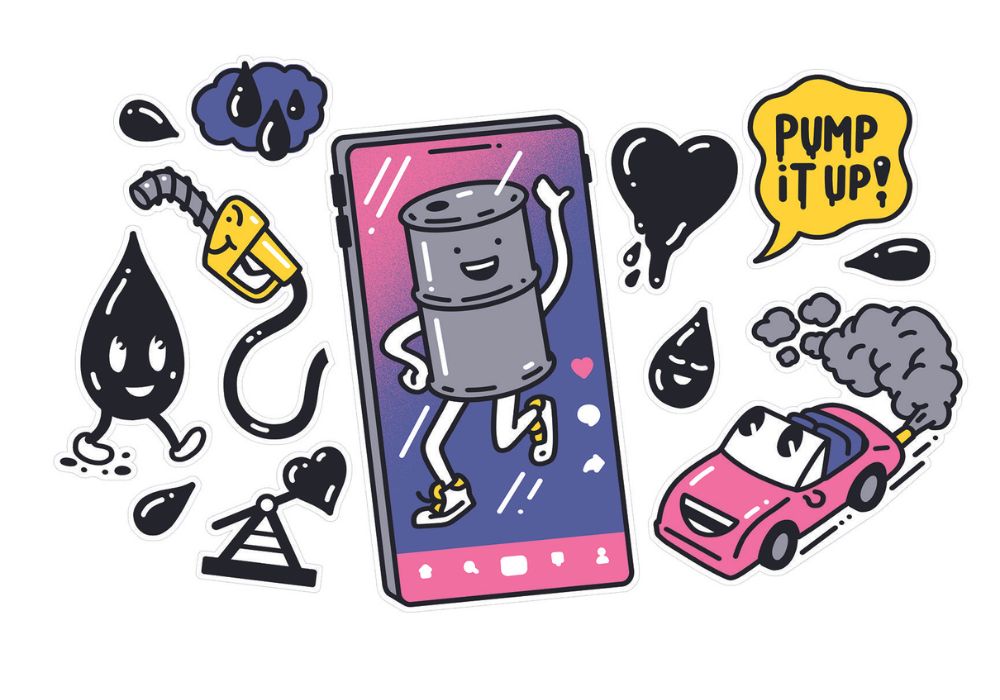In November 1959, some 300 businessmen, scientists and government officials gathered at Columbia University in New York to celebrate the first hundred years of commercial oil exploitation in the United States. The mood was triumphant: fossil fuels were the lifeblood of the world’s largest economy, powering the postwar boom, industrial expansion and the suburban American dream.
But then a man with bushy black eyebrows and a heavy Eastern European accent took the stage. Speaking in measured terms, the nuclear physicist Edward Teller – known for his central role on the Manhattan Project – rained on the entire parade. Fossil fuels, he explained, could not be relied on for the energy of the future. Not only was their supply finite, but they were also “contaminating the atmosphere.” The carbon dioxide released in their combustion was causing a “greenhouse effect” that threatened to melt ice caps and submerge coastal cities.
“I think that this chemical contamination is more serious than most people tend to believe,” Teller warned.
Big Oil listened. And carried on.
Doing so, however, has required promulgating the fiction that fossil fuels are an instrumental force for good, amidst mounting evidence to the contrary. Today the PR industry propping up the sector is considered one of the biggest obstructions to climate change mitigation. As the medium goes digital and the message becomes more subtle and diffuse, pro-oil marketing is being baked into our social media feeds and infiltrating climate conferences. But efforts are ramping up to shut it down.
From Kyoto to TikTok
Over the last half-century, Big Oil’s spin doctors have used every trick in the book to keep the public on side. Initially the mood was oddly boastful. Three years after Teller’s warning, Humble Oil (now ExxonMobil) trumpeted in its ads, “Each day Humble supplies enough energy to melt 7 million tons of glacier!” As climate science advanced, oil companies and trade associations went to every length to undermine it, from running full-page advertorials in The New York Times by front groups like the Informed Citizens for the Environment in the 1980s, to using climate-branded lobby groups to stop the U.S. from ratifying the Kyoto Protocol in 2001.
But as catastrophic wildfires, floods, droughts and hurricanes began to capture the headlines, climate denialism waned. A twofold strategy replaced it: virtue-signal green in public, lobby black in private. British Petroleum paved the way. Rebranded as Beyond Petroleum in 2001, the company went on to run a campaign, devised by Ogilvy & Mather, that introduced the notion of the “carbon footprint” (not yet in common parlance) and encouraged individuals to reduce their own, even providing a calculator on its website for the purpose. Subtly, the onus of carbon reduction was shifted from the company onto the consumer.
As climate awareness grew, Big Oil’s advertising budgets exploded. Between 2008 and 2016, the five biggest oil companies (ExxonMobil, BP-Amoco, Chevron-Texaco, Royal Dutch Shell and ConocoPhillips) collectively spent an average of US$217 million on advertising annually, a sixfold increase from two decades earlier, according to a 2019 paper in the journal Climatic Change.
In the last decade, the PR push has moved deeper online, engaging all the tools of social media and cyberculture to persuade today’s youth that fossil fuels are cool, fun and virtuous. Oil companies are working with gamers to integrate their logos into virtual racecourses and hiring digital marketing managers to run TikTok and Instagram channels that spool video reels featuring young people interacting with their brands.
But it’s a tough sell to a climate-conscious generation that is more committed to reducing its environmental impact than any before it. “We’re seen as one of the bad guys,” BP admitted in a leaked presentation that it made to a group of PR companies in 2020, asking the marketing minds how best to make the company seem more “relatable, passionate and authentic” to the next generation, “the people with the biggest voice.”
Their answer has been to rely heavily on the tactic of misdirection, training attention away from the product and onto nicer things: nature imagery and lifestyle motifs like sports and fashion. Shell in particular has made good use of influencers: online personalities who attract large followings on platforms like TikTok, Instagram, X and, most recently, Twitch.
“When I was younger, I struggled with self-belief,” U.S. Open surfing champion Sage Erickson tells her 308,000 followers on Instagram. Saturated shots of the blonde beauty riding turquoise waves suggest that she has gotten over it. In the accompanying text, Erickson thanks Shell for allowing her to tell her story as part of its “Performance Unbound” series, which features short videos of young athletes achieving greatness in various ways. There is no evident connection to Shell or its products, beyond the little scallop-shell icon and the influencer’s gratitude.
Shell has also sent British celebrities on global adventures to highlight the company’s investment in renewables. For a five-episode YouTube series launched in the lead-up to Earth Day 2023, former BBC presenter Dallas Campbell travelled the world to tout, in actorly British tones, the “exciting potential of hydrogen.” In 2017, Shell sponsored polar explorer Robert Swan and his son on an expedition to the South Pole to promote biofuel. Photos of the journey were beamed out on Shell’s Twitter account. American PR giant Edelman, which was behind the stunt, boasted on its website that the publicity reached 600 million people and made viewers “31% more likely to believe” that Shell is “committed to cleaner fuels.”
Belief is what matters here; advertising aims to win hearts, not minds. By its own account, Shell invested some 14% of its total expenditure in 2022 in “renewables and energy solutions” – a figure that environmental groups say is vastly inflated. Either way, the amount is a marginal fraction of its total business. A 2022 analysis by Harvard University and the Algorithmic Transparency Institute found that almost three-quarters of the social media posts by 22 leading oil and gas companies promoted green technologies – on which those same companies had, on average, invested less than 2% of their total expenditure in the decade previous.
Cancelling oil industry greenwash
There’s a growing consensus that the PR companies involved in greenwashed campaigns need to be held to account. Addressing the UN General Assembly in 2022, Secretary-General António Guterres took aim at the “massive PR machine raking in billions to shield the fossil fuel industry from scrutiny.” Clean Creatives, an initiative founded in 2020 to break the PR industry’s support of fossil fuels, publishes an annual “F-list” detailing which agencies are working for which fossil fuel companies. This year’s worst offender, with 55 fossil fuel contracts, is the British holding company WPP, which, in a gross contradiction, has pledged to achieve net-zero emissions in its operations by 2025.
For companies in the business of image management, naming and shaming can be effective. More than 700 agencies in 38 countries have signed Clean Creatives’ pledge not to work with fossil fuel clients. But for many, oil and gas is their bread and butter. Founded in 1952, Edelman built its brand with clients like ExxonMobil, Shell and the American Petroleum Institute. More recently, it was instrumental in greening up the image of the United Arab Emirates (UAE); the campaign, launched in 2007, laid the groundwork for the petroleum-exporting country’s successful bid to host COP28 last December.
Each day Humble supplies enough energy to melt 7 million tons of glacier!
– Humble Oil (Now ExxonMobile) advertisement in Life magazine, June 1962
Edelman remains intransigent. It dismissed a petition that circulated at COP26, asking it to cut ties with the fossil fuel industry. CEO Richard Edelman argued that oil companies need PR support through the energy transition and added that, since 2015, Edelman has refused to work with outright climate deniers.
“They claim, ‘We’re good corporate actors. We don’t need regulation,’” said Christine Arena, one of six executives who quit Edelman in 2015 after learning of the company’s deep involvement with the fossil fuel industry. She went on to testify before a 2022 U.S. congressional hearing into the role of PR companies in climate misinformation and obstruction. In conversation with Drilled podcaster Amy Westervelt, Arena calls the factual distortions, greenwashing and omissions that characterize fossil fuel advertising “uniquely harmful.”
But they’re not without precedent. The tobacco industry used much the same tactics – and many of the same agencies – to promote its products. This parallel has served as inspiration for the Canadian Association of Physicians for the Environment (CAPE), a coalition of medical doctors and concerned citizens that has petitioned Ottawa to ban advertisements for fossil fuels, gas utilities and gas vehicles. Echoing the reasoning that led to Canada’s near-complete ban on tobacco advertising, CAPE cited, in an open letter in 2022, the impact of air pollution from fossil fuels: an annual death toll of somewhere between 15,000 and 34,000 Canadians, according to Health Canada.
The coalition has also filed a greenwashing complaint with the federal Competition Bureau against the Canadian Gas Association’s promotion of gas as an affordable, sustainable and clean energy source, arguing that the production of natural gas in fact causes air and water pollution, while gas stoves have been shown to increase the risk of asthma in children.
Marc Bishai, a lawyer with the Centre québécois du droit de l’environnement, a Montreal-based organization that offers legal expertise on environmental and climate-related issues, says CAPE’s medical tack is smart from a legal standpoint. But overall, he feels that Canada is profoundly ill-equipped to tackle the problems of green- and climate-washing. “It’s an exercise in Whac-a-Mole,” he says of a system that relies on complaints, rather than proactively monitoring the marketplace. Furthermore, he argues that Canada has to refine its standards for corporate claims, much as it has financial disclosure standards. There is still no regulatory consensus, for instance, on what conditions have to be met to label something “climate-neutral” or “net-zero.”
They claim, ‘We’re good corporate actors. We don’t need regulation.’
– Christine Arena, one of six executives who quit Edelman in 2015
In the last two years, at least three climate-washing complaints have been filed with the Competition Bureau. One was lodged against Shell Canada’s “Drive Carbon Neutral” campaign of 2020, which encouraged drivers to purchase carbon credits for nature protection projects as they tanked up. Greenpeace, which launched the complaint, challenged Shell’s emissions mathematics. In December, the Bureau said it was closing its investigation because Shell had pulled the advertising from its Canadian website and app, a move that Greenpeace celebrated.
Meanwhile, jurisdictions with more specific standards have been decisive. In 2021, the Dutch Advertising Code Committee – which draws on a Sustainable Advertising Code – ordered Shell to discontinue the Dutch version of its “Drive Carbon Neutral” campaign, arguing that the neutrality claim could not be proven.
The U.K.’s Advertising Standards Authority, which expanded its guidance on green claims last summer, recently banned a Shell ad campaign promoting the company’s green activities on the basis that it “misrepresented the contribution that lower-carbon initiatives played . . . as part of the overall balance of a company’s activities.” The ruling was significant because it challenged the campaign not for what it said, but for what it failed to say.
This is the kind of rigour needed to combat Big Oil’s powers of persuasion. The industry is on a roll. With its invasion of Ukraine, Russia has served the fossil fuel industry a silver tablet of record profits and heightened concerns about energy security, which it has used to justify prioritizing hydrocarbons over renewables.
Climate Action Against Disinformation, a global coalition of organizations opposed to climate obfuscation, analyzed oil companies’ Facebook ads in the 10 months leading up to COP28. It found millions of dollars in ads steeped in “delayism,” implying that global energy insecurity and the high cost of living justified an expanded role for fossil fuels.
In the last year, amid soaring oil and gas returns, Shell, ExxonMobil and BP all reduced their commitments to renewables. BP announced a US$1-billion annual increase in its investment in oil and gas for the rest of the decade, jettisoning its ambition of cutting oil production by 40% in that time period. In all, the International Energy Agency has forecast that 2023 will see global investment in fossil fuels increase by 11%, reaching its highest level since 2015.
Many consider the UAE’s hosting of COP28, under the aegis of oil titan Sultan Ahmed Al Jaber, proof that the fossil fuel industry and its marketing agencies have fully co-opted the climate conversation. Now more than ever, governments and regulators have to ensure that the conversation is shaped by transparency and facts and not profit-driven bluff.
Naomi Buck is a Toronto-based writer.







